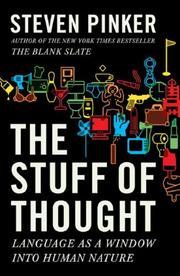Rational Ignorance
Of course, it is a cliché of our times that we suffer from information overload because of the ubiquity of electronic media. And for fifty years, cognitive scientists have been harping on the limitations of the brain in processing information. Some have argued that Grice’s cooperative maxims are a way to manage the flow of information in a conversation, maximizing the rate of transmission of usable knowledge.
But the ultimate reason our speech is so indirect may lie in a different danger of information—not that we might be overwhelmed by how much there is, but that we might be poisoned by what it says. The paradox of rational ignorance is that even if we could accommodate as much information as we wanted, and could always separate the wheat from the chaff, there are certain messages a rational mind may not want to receive.
Sometimes we choose not to know things because we can anticipate that they would have an uncontrollable effect on our emotions. In support of his “Law of Indispensable Ignorance,” the psychologist Gerd Gigerenzer lists some examples. People who haven’t seen a movie or read a book will shun a review that gives away the ending. A basketball fan who videotapes a game will sequester himself from media outlets so as not to learn the outcome before he watches it. Many expectant parents choose not to learn the sex of their unborn child, and in countries ravaged by the selective abortion of girls, divulging the information can be a crime. The considerable number of families in which a child is unrelated to the nominal father would probably be happier if none of them took a DNA test. The children of parents with Huntington’s disease usually refuse to take the test that would tell them whether they carry the gene for it. And most of us would rather not know the day on which we will die.
Another reason a rational system might choose to be ignorant is that if it is designed to come to an unbiased decision, the slightest bit of extraneous information can tip it one way or another. So juries are prevented from knowing the criminal record of the accused, or information that the police obtained by illegal means. Scientists test drugs in double-blind studies, where they keep themselves from knowing who got the drug and who got the placebo. Scholarly manuscripts are refereed anonymously, with the identities of the author and the reviewers hidden. And government contracts are awarded through sealed bids.
But the kind of rational ignorance that can best explain why we veil our speech comes from the Strangelovian dilemmas in which our own rationality can be turned against us and a unilateral disarmament of knowledge is the only countermeasure (another set of paradoxes first explored by Schelling).63 People are better off if they can’t receive a threat. Hence misbehaving children avoid their parents’ glances, state’s witnesses may be held incommunicado, and I know a colleague who kept a nice jacket and perhaps his life because he couldn’t understand some muggers who were threatening him in a heavy accent. Being in possession of a secret makes one vulnerable to extortion by those who want to know it and to silencing by those who don’t want it known. Hence kidnap victims are better off if they don’t see the kidnapper’s face, envoys are kept ignorant of sensitive information for their own safety, and we have the spy-movie cliché, “I could tell you, but then I would have to kill you.” In a Coordination Game, the person with the least information is in the better position: if two friends are negotiating over where to have dinner, the one who suggests a restaurant convenient to her just before her cell phone goes dead will have the shorter walk.
Notes:
Folksonomies: information ignorance
Taxonomies:
/family and parenting/children (0.535925)
/law, govt and politics/government/government contracting and procurement (0.442499)
/law, govt and politics/law enforcement/police (0.426897)
Keywords:
rational ignorance (0.944599 (negative:-0.709019)), information (0.836332 (negative:-0.038178)), psychologist Gerd Gigerenzer (0.831102 (negative:-0.215607)), Indispensable Ignorance (0.751975 (neutral:0.000000)), rational mind (0.735377 (neutral:0.000000)), information overload (0.728250 (negative:-0.445521)), cooperative maxims (0.704385 (positive:0.577242)), extraneous information (0.701239 (negative:-0.791389)), electronic media (0.695792 (negative:-0.445520)), usable knowledge (0.693167 (positive:0.502593)), uncontrollable effect (0.691125 (negative:-0.676576)), cognitive scientists (0.688402 (negative:-0.529710)), ultimate reason (0.685450 (negative:-0.781552)), different danger (0.684167 (negative:-0.781552)), sensitive information (0.681358 (negative:-0.570166)), slightest bit (0.680360 (negative:-0.791389)), expectant parents (0.679443 (negative:-0.645806)), double-blind studies (0.679168 (negative:-0.284383)), unborn child (0.678252 (negative:-0.645806)), unilateral disarmament (0.677817 (neutral:0.000000)), certain messages (0.677482 (neutral:0.000000)), basketball fan (0.677071 (negative:-0.317546)), considerable number (0.676467 (neutral:0.000000)), nominal father (0.672489 (neutral:0.000000)), media outlets (0.671485 (negative:-0.317546)), selective abortion (0.669749 (negative:-0.459154)), kidnap victims (0.667674 (negative:-0.587332)), criminal record (0.667498 (negative:-0.790202)), Strangelovian dilemmas (0.666373 (neutral:0.000000)), heavy accent (0.666027 (negative:-0.366873))
Entities:
DNA test:FieldTerminology (0.715342 (negative:-0.581479)), Gerd Gigerenzer:Person (0.600752 (negative:-0.215607)), Grice:Person (0.592020 (positive:0.577242)), electronic media:FieldTerminology (0.585219 (negative:-0.445521)), extortion:Crime (0.559234 (negative:-0.660243)), basketball:Sport (0.543705 (negative:-0.317546)), media outlets:FieldTerminology (0.517587 (negative:-0.317546)), Schelling:Person (0.488957 (positive:0.389798)), fifty years:Quantity (0.488957 (neutral:0.000000))
Concepts:
Bounded rationality (0.938657): dbpedia | freebase | yago
DNA (0.829437): website | dbpedia | freebase | yago
Game theory (0.803294): dbpedia | freebase | opencyc
Reason (0.725943): dbpedia | freebase
Epistemology (0.662552): dbpedia | freebase | opencyc
Rationality (0.659431): dbpedia | freebase
Knowledge (0.658109): dbpedia | freebase





